Featured Author
Sarah Doudney (1841-1926)
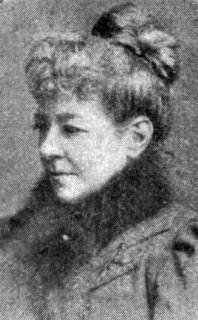 Miss Sarah Doudney was born in Portsmouth on the 15th January, 1841 and christened at St Mary's, Portsea a month later. Both her parents came from the Portsmouth area and her father, George Ebenezer Doudney, the son of a tallow chandler, ran a candle and soap manufacturing business in partnership with his brother Edward. The business had factories dispersed around the country at Mile End, Portsmouth and Plymouth.
Miss Sarah Doudney was born in Portsmouth on the 15th January, 1841 and christened at St Mary's, Portsea a month later. Both her parents came from the Portsmouth area and her father, George Ebenezer Doudney, the son of a tallow chandler, ran a candle and soap manufacturing business in partnership with his brother Edward. The business had factories dispersed around the country at Mile End, Portsmouth and Plymouth.
It is likely that Sarah was brought up in a strict protestant household. Her uncle Edward wrote in a letter of a business transaction,
"After I took the order, as my custom is, if I have the opportunity, I spoke a word or two as to the unsatisfactory nature of earthly things and the importance of soul matters."
Another uncle, David, purchased and edited the Calvinist Gospel Magazine for six years before travelling to Ireland in 1846 to distribute funds raised by his readers for the relief of the Irish Famine. In 1847 he was ordained an Anglican vicar in Ireland, serving there for several years before returning to work in England.
Miss Doudney was educated at Madame Dowell's College in Southsea, which was, in fact, a school for French girls. She wrote one "tale of schoolgirl life," entitled Monksbury College, and a number of her heroines are teachers, including Cecily Woodburn in the first of her novels published in the Girl's Own Paper, Michaelmas Daisy (1881). However, schools and teachers are not placed on the pedestals set up for them by later writers. Cecily is spoken of as "merely a teacher in a school," as "only a teacher in a school," and her niece Daisy, a pupil there who was generally very high-minded in her outlook, speaks of her "toiling on in the stupid old school." Mary Berrithorne in A Long Lane with a Turning (1883) only seems to concentrate on her education because she knows she will eventually have to become a teacher herself. The joy of education for its own sake does not figure very largely - the stream of vigorous boarding-school stories by the likes of Angela Brazil and Dorita Fairlie Bruce were to come a little later. Even the novelist Grace Stebbing who writes of boarding school life in That Aggravating Schoolgirl published in the same Girl's Own volume as Michaelmas Daisy qualifies her support of a school education at the end of her novel:
"School is the only place for some girls, girls like me, for instance, who are learning to think themselves perfect and all-important at home. But for girls like you, whose whole object in life is to put themselves on one side, Miss Crofton says, and I say, school is a mistake. There are so many people there ready to put them on one side that at last they creep into a bush altogether, and get smothered..."
Very early in life Sarah Doudney began contributing poetry and fiction to magazines such as The Churchman's Family Magazine, an Anglican periodical with the majority of its articles written by clergymen. However, among its female contributors was Charlotte M Yonge, whose The Clever Woman of the Family was serialised in 1864-5.
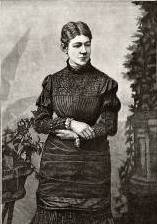 Her first novel Under Gray Walls - a tale of Little Bessie Mere, her family, long lost brother, a war, and a neighbourhood cathedral - was published by the Sunday School Union in 1871. Her third book, Archie's Old Desk published in 1872, made her reputation. It was a novel whose success was reflected by its appearance in Arnold Bennett's 1910 novel Clayhanger. Edwin Clayhanger is set to sort through the "Sunday school prize stories" in his father's print and stationery shop:
Her first novel Under Gray Walls - a tale of Little Bessie Mere, her family, long lost brother, a war, and a neighbourhood cathedral - was published by the Sunday School Union in 1871. Her third book, Archie's Old Desk published in 1872, made her reputation. It was a novel whose success was reflected by its appearance in Arnold Bennett's 1910 novel Clayhanger. Edwin Clayhanger is set to sort through the "Sunday school prize stories" in his father's print and stationery shop:
" 'Thirteen Archie's Old Desk,' he read on a parcel, but when he opened the parcel he found seven 'From Jest to Earnest' [by the American clergyman writer E P Roe]."
Much of Doudney's fiction was published by the Religious Tract Society, the publishers of the Girl's Own Paper to which she was a frequent contributor. A writer also for the Sunday Magazine, Good Words, and the Quiver amongst others, she declared herself to be a "Writer for Monthly Journals" on the 1881 census. By the time of the 1891 census she had the confidence to state that she was a "Novelist". Indeed, she had written around 35 novels by that time as well as numerous poems, her Psalms of Life having appeared in 1871.
A glimpse of her struggles to be published can be seen mirrored in the character of Mary Berrithorne in A Long Lane With a Turning. Mary, like her creator, has been writing poetry from a very young age and is embarrassed when the malicious Cassie tells their friends that "She means to astonish the world by-and-bye." However, she perseveres and is at last successful. In the novel, Sarah Doudney writes:
The story of authors' lives has been told, and is being told, year after year. As one by one they pass away from us we learn something of their first struggles - of the heartaches and repulses, and of the grand resolute patience that accompanies the consciousness of power. When the brain takes its final rest and the pen is laid down for ever, the world knows more of the writer than it has ever known before. It finds a new meaning in the printed words when it hears that he who wrote them was sharply schooled before he taught. Mary Berrithorne's experiences were those of many others. Step by step she climbed the rocky height - often stumbling, often repulsed, but always persisting in the ascent.
Mary is told by an older friend, "Don't be afraid to put forth all your strength," and taking that advice Mary "woke one morning and found herself famous."
Nowadays, Miss Doudney is known generally for her hymns, which include The Christian's Good Night (which was set to music by Ira D Sankey in 1884 and sung at the funeral of the great London preacher, Charles H Spurgeon), Lord of the Golden Harvest, Saviour, Now the Day is Ending and The Master Hath Come. The latter can be found on the Precious Lord Take My Hand website in the section for "Most Popular Christian Hymns and Gospel Songs." She also wrote a number of secular poems, her first, The Lessons of the Water Mill, apparently composed when she was only 15 years old, became a popular song in America. Another Pansies led to the creation of the "Sarah Doudney" pansy.
Much of her fiction published in the Girl's Own Paper concerns the struggles of orphaned, impoverished girls of good birth, who are intelligent and good needlewomen trying to make their way in the world trusting that God will sustain and guide them on the right path. When Mary Berrithorne breaks her engagement with the faithless James Listowe in A Long Lane With a Turning it is her faith which sustains her:
Did the loss of that human love leave the spirit freer to seek the love Divine? Not at first; because the burden of shattered hopes was pressing her down to the dust...On Sunday afternoon she went alone to the old church...The old prayers and the familiar perfumes soothed her and set her tears flowing; and, by-and-by, she was conscious of a great peace. For twelve months she had been a very troubled creatures, tormented by doubts, struggling with self-reproaches, always asking her heart questions which could not be answered. It was all over now; "all the dull, deep pain, and the constant anguish of patience," and while she knelt in her quiet corner, she thanked God for the ending...
Some of her fiction was also directed at older readers including, A Woman's Glory (1883), The Missing Rubies (1886) and Lady Dye's Reparation (1899).
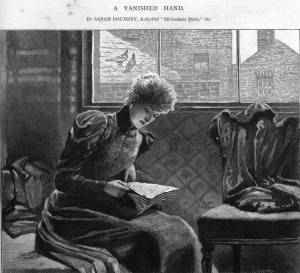 For the majority of her life she lived with her parents in and around Portsmouth, listing her recreations in Who's Who as "walking" and "antiquarianism." She spent some of her time in London but seems to have had no love for the city. In her novels nobody is happy in London and the characters do not find peace until they have moved out to the country. Elsie Kilner, one of Miss Doudney's older heroines in A Vanished Hand (1893-4), dreams of returning to the country whilst staring out at the pigeons and chimneys of London. Once settled at Willow Farm she declares, "It is delicious to get away from London, delicious to tread on cool grass instead of hot paving-stones." Daisy in Michaelmas Daisy is made miserable by her relatives in a gloomy mansion in Portland Place. At first she can only be thankful for her situation by thinking of the "thousand homeless ones in mighty London that night;...starving children seeking rest in the doorways and under the arches;...ragged women wandering by the river's brink, and tempting death;...desperate men straying aimlessly along the streets, without a hope to brighten the coming morrow." As soon as Bertha Varner in A Long Lane With a Turning arrives in London she exclaims,
For the majority of her life she lived with her parents in and around Portsmouth, listing her recreations in Who's Who as "walking" and "antiquarianism." She spent some of her time in London but seems to have had no love for the city. In her novels nobody is happy in London and the characters do not find peace until they have moved out to the country. Elsie Kilner, one of Miss Doudney's older heroines in A Vanished Hand (1893-4), dreams of returning to the country whilst staring out at the pigeons and chimneys of London. Once settled at Willow Farm she declares, "It is delicious to get away from London, delicious to tread on cool grass instead of hot paving-stones." Daisy in Michaelmas Daisy is made miserable by her relatives in a gloomy mansion in Portland Place. At first she can only be thankful for her situation by thinking of the "thousand homeless ones in mighty London that night;...starving children seeking rest in the doorways and under the arches;...ragged women wandering by the river's brink, and tempting death;...desperate men straying aimlessly along the streets, without a hope to brighten the coming morrow." As soon as Bertha Varner in A Long Lane With a Turning arrives in London she exclaims,
"I am so miserable, Cassie...This house is like a prison, and the streets are so much alike that it would take years to tell one from another. Oh, how I wish that all the opposite doors and windows didn't match so exactly! And then one can hardly see a bit of sky, and what one does see isn't the proper sky-colour."
Sarah's mother Lucy Doudney died in 1891 and her father followed soon after in 1893. She seems to have been very close to her mother if this extract from A Vanished Hand published in 1893, is anything to go by:
They both knew that the loss of a mother leaves a void which can only be filled up in heaven, and perhaps the first treasure restored to us there will be the unspeakable gift of a mother's love.
Following the deaths of her parents Sarah Doudney moved to Oxford where she died at 69 Woodstock Road in December 1926. Whilst there she wrote a poem entitled Great Tom of Oxford about the Christchurch bell which I feel she would have liked as an epitaph. It ends:Toll on, Great Tom, in your lonely tower,
O'er meadow, and ford, and fen;
Strike deeper and deeper, with holy power,
To quicken the souls of men!
With especial thanks to my mum for researching the Census information
Biographical Bibliography
- Bennett, A. Clayhanger. London: Methuen & Co. Ltd, 1910, Chapter 8, Section II.
- British Library Integrated Online Catalogue http://catalogue.bl.uk.html
- Girl's Own Paper index online
- http://search.ancestry.com
- http://www.anvil.clara.net/sarah.htm
- http://www.cyberhymnal.org/htm/c/g/cgoodnit.htm
- http://www.familysearch.org
- http://www3.clearlight.com/~acsa/songfile/ANDWEBID.HTM
- Showalter, E. A Literature of Their Own: from Charlotte Bronte to Doris Lessing. London: Virago Press Ltd, 1982.
- Sutherland, J. The Longman Companion to Victorian Fiction. Singapore: Longman, 1990.
- UK Census online
Here are a few extracts from some of Sarah Doudney's fiction
Michaelmas Daisy (Girl's Own Paper May 7, 1881)
Mrs Andrew Garnett was born in the country. From her babyhood she had been surrounded by woods and green fields, and her first playthings were buttercups and daisies. At nineteen she had left her home at the old farm to become the wife of a doctor, living in a street in a crowded town.
It was a close unwholesome street, and the house was small and inconvenient to the last degree. Its back windows overlooked a wretched little piece of ground which had been part of a garden in bygone days; but the smoke of factory chimneys had blighted the growth of green things, and most of the plants had perished long ago. In one corner, however, there was a clump of Michaelmas daisies that persisted in flourishing and blooming in their season...
A Vanished Hand (Girl's Own Paper January 20, 1894)
"We're going to church," said Jamie. "You shall sit by my side. It ain't a very pretty church."
"Oh, Master Jamie, 'ain't' again!" nurse murmured, in a tone of mild reproof.
"But there's nice things in it," continued Jamie, paying no attention to the good woman. "There's a man, cut out of stone, lying on his back, and he's lost his nose. He twies to put his hands together, but can't, not properly, 'cos some of his fingers has come off."
Dick Hartwell's Fortune (Girl's Own Paper, March 12, 1898)
Minnie was sitting in the back garden with some light work in her lap, and no one could have denied that she looked really lovely. She knew just how to pose herself. That fluffy golden head of hers came out admirably against a background of purple clematis. Her big blue eyes were raised languidly to give her lover a greeting.
The Angel's Gift (Girl's Own Paper, December 8, 1900)
It was the immortal story of Faith told in divine melody; it was the noble scorn of a true soul for the noise and tinsel of earth. It was the glorious joy of one who has seen the Beatific Vision, and counted all the grandeur of this earth as dross.
A small review
Where the Dew Falls in London (1890)
QUIVER 1890 "Where the Dew Falls in London," which is by our old friend Sarah Doudney, is also another story particularly suited for elder girls, who can enter into the strong drawing of Miss Doudney's characters.
Three Poems by Sarah Doudney
CAVE CANEM!
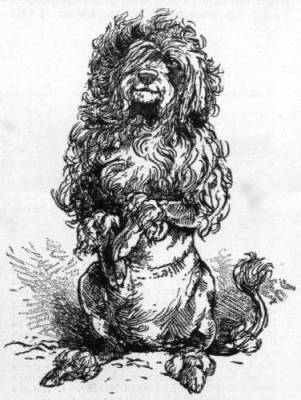 Who haunts your doorstep night and day,
Who haunts your doorstep night and day,
And scares your faithful friends away,
In spite of all they do and say?
Your poodle dog.
Who drenches ladies' cheeks with tears,
And fills their gentle life with fears,
And hurries them to early biers?
Your poodle dog.
Who makes a man a horrid bear,
And when the parson tears his hair,
Puts out his tongue and doesn't care?
Your poodle dog.
Who strews the road with shoes and socks,
And fragments torn from women's frocks,
Then shows his teeth, and grins and mocks?
Your poodle dog.
Who spoils the fun at every feast,
And won't obey you in the least,
A bouncing, barking, blatant beast?
Your poodle dog.
Oh, when his place of rest is found,
I'll dance with glee upon the mound
That hides at last from sight and sound
Your poodle dog!
THE GIRL'S OWN PAPER, 1893 - published under the heading "A Difference of Opinion" alongside a poem by C.P. extolling the virtues of his poodle dog and entitled, "Qui M'Aime, Aime Mon Chien!"
WAITING FOR CHURCH
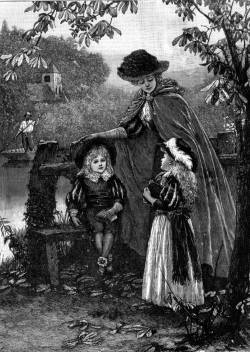 Lights and shadows, shifting - blending Lights and shadows, shifting - blending
On the level sward below,
Graceful branches, swaying, bending
O'er the river's quiet flow;
All the faint delicious murmur
Of the summer in the air,
And the church-bells chiming - calling
To the Father's house of prayer.
Drifting softly, floating slowly
Through the stir of leaves and flowers,
Comes that message clear and holy,
Speaking to this earth of ours;
Speaking to the little children
In the dawn of life's fair day,
Saying, "Seek Me, seek Me early,
In mine own appointed way.
"Seek Me while the dew remaineth
On the blossoms of the heart,
Ere the world's pollution staineth,
Or the virgin blooms depart:
Soon the freshness will be over,
Soon the petals fade and pale;
Come to Me - and I will bless thee
With a joy that cannot fail."
Father, show me how to praise Thee
When I seek Thy courts to-day;
Guide me by Thy love, and raise me -
Let me feel the words I say.
Bless me on this hallowed morning,
Bid my soul to Thee draw near;
Teach me, and my heart shall listen -
Speak, Lord, and Thy child shall hear.
THE GIRL'S OWN PAPER, 1888 |
SOME WORDS
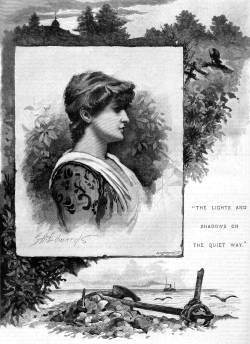 Only some words about the dear old times, Only some words about the dear old times,
Spoken amid the clamour of the street,
But they were like the music of the chimes
Drifting across the meadows, faintly sweet.
Only some words from one who knew the past,
Whose eyes had seen the light of suns gone down -
Such simple words! and yet a spell was cast
Upon the tumult of the noisy town.
I saw once more the home among the hills,
The lights and shadows on the quiet way,
The budding boughs, the gold of daffodils,
The long, soft grasses waving all the day
The shades grew deeper, and, behold, I dreamed
A dream of summer woods in gloom and glow.
Leaves changed and fell, and scarlet berries gleamed,
Dropping, like coral beads, on heaps of snow.
Only some words; but neither brush nor pen
Could paint such pictures for my weary eyes.
Beyond the crowd - beyond the strife of men -
I looked, and saw those lovely visions rise.
Such simple words! But words are mighty things;
They cast us down, or lift us up to rest;
They charm and strengthen, till our angel sings
The last of all the life-songs, and the best.
THE GIRL'S OWN PAPER, 1894 |
Incidentally...
A version of Sarah Doudney's The Christian's Good Night was sung a capella by the group the Grateful Dead to close many of their concerts in the late sixties and early seventies and again in 1989-91!!!
I would love to read the short story Where Swallows Build by Sarah Doudney
Click here to see a list of her works
HOME
See other featured authors: Mrs George Linnaeus Banks, Sir Walter Besant, Rosa Nouchette Carey, Dutton Cook, Dinah Craik, Ellen Thorneycroft Fowler, Mary E Hullah, Edna Lyall, Isabella Fyvie Mayo, William Edward Norris, GB Stuart, CEC Weigall.
 Miss Sarah Doudney was born in Portsmouth on the 15th January, 1841 and christened at St Mary's, Portsea a month later. Both her parents came from the Portsmouth area and her father, George Ebenezer Doudney, the son of a tallow chandler, ran a candle and soap manufacturing business in partnership with his brother Edward. The business had factories dispersed around the country at Mile End, Portsmouth and Plymouth.
Miss Sarah Doudney was born in Portsmouth on the 15th January, 1841 and christened at St Mary's, Portsea a month later. Both her parents came from the Portsmouth area and her father, George Ebenezer Doudney, the son of a tallow chandler, ran a candle and soap manufacturing business in partnership with his brother Edward. The business had factories dispersed around the country at Mile End, Portsmouth and Plymouth. Her first novel Under Gray Walls - a tale of Little Bessie Mere, her family, long lost brother, a war, and a neighbourhood cathedral - was published by the Sunday School Union in 1871. Her third book, Archie's Old Desk published in 1872, made her reputation. It was a novel whose success was reflected by its appearance in Arnold Bennett's 1910 novel Clayhanger. Edwin Clayhanger is set to sort through the "Sunday school prize stories" in his father's print and stationery shop:
Her first novel Under Gray Walls - a tale of Little Bessie Mere, her family, long lost brother, a war, and a neighbourhood cathedral - was published by the Sunday School Union in 1871. Her third book, Archie's Old Desk published in 1872, made her reputation. It was a novel whose success was reflected by its appearance in Arnold Bennett's 1910 novel Clayhanger. Edwin Clayhanger is set to sort through the "Sunday school prize stories" in his father's print and stationery shop: For the majority of her life she lived with her parents in and around Portsmouth, listing her recreations in Who's Who as "walking" and "antiquarianism." She spent some of her time in London but seems to have had no love for the city. In her novels nobody is happy in London and the characters do not find peace until they have moved out to the country. Elsie Kilner, one of Miss Doudney's older heroines in A Vanished Hand (1893-4), dreams of returning to the country whilst staring out at the pigeons and chimneys of London. Once settled at Willow Farm she declares, "It is delicious to get away from London, delicious to tread on cool grass instead of hot paving-stones." Daisy in Michaelmas Daisy is made miserable by her relatives in a gloomy mansion in Portland Place. At first she can only be thankful for her situation by thinking of the "thousand homeless ones in mighty London that night;...starving children seeking rest in the doorways and under the arches;...ragged women wandering by the river's brink, and tempting death;...desperate men straying aimlessly along the streets, without a hope to brighten the coming morrow." As soon as Bertha Varner in A Long Lane With a Turning arrives in London she exclaims,
For the majority of her life she lived with her parents in and around Portsmouth, listing her recreations in Who's Who as "walking" and "antiquarianism." She spent some of her time in London but seems to have had no love for the city. In her novels nobody is happy in London and the characters do not find peace until they have moved out to the country. Elsie Kilner, one of Miss Doudney's older heroines in A Vanished Hand (1893-4), dreams of returning to the country whilst staring out at the pigeons and chimneys of London. Once settled at Willow Farm she declares, "It is delicious to get away from London, delicious to tread on cool grass instead of hot paving-stones." Daisy in Michaelmas Daisy is made miserable by her relatives in a gloomy mansion in Portland Place. At first she can only be thankful for her situation by thinking of the "thousand homeless ones in mighty London that night;...starving children seeking rest in the doorways and under the arches;...ragged women wandering by the river's brink, and tempting death;...desperate men straying aimlessly along the streets, without a hope to brighten the coming morrow." As soon as Bertha Varner in A Long Lane With a Turning arrives in London she exclaims, Who haunts your doorstep night and day,
Who haunts your doorstep night and day, Lights and shadows, shifting - blending
Lights and shadows, shifting - blending Only some words about the dear old times,
Only some words about the dear old times,